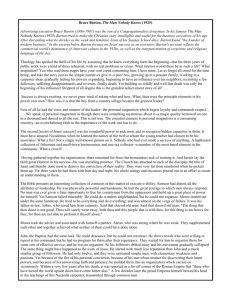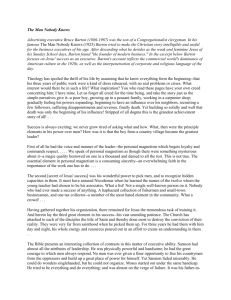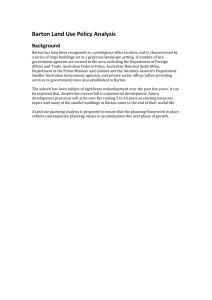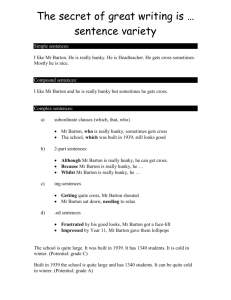Barton's Techniques - Marion City Schools
advertisement
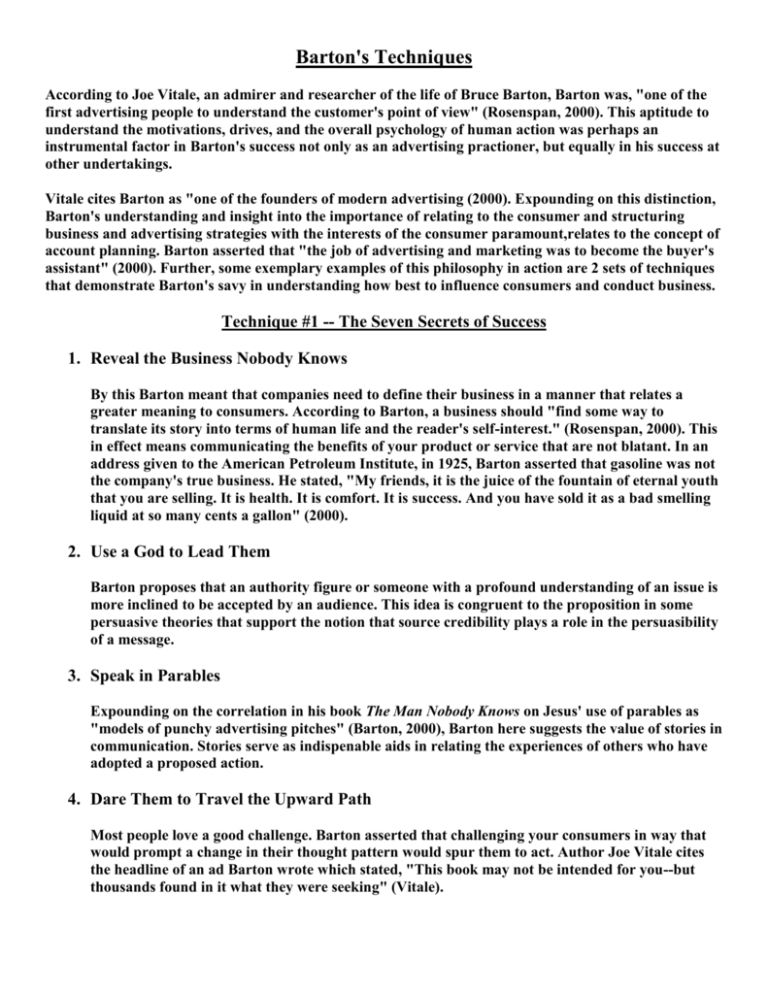
Barton's Techniques According to Joe Vitale, an admirer and researcher of the life of Bruce Barton, Barton was, "one of the first advertising people to understand the customer's point of view" (Rosenspan, 2000). This aptitude to understand the motivations, drives, and the overall psychology of human action was perhaps an instrumental factor in Barton's success not only as an advertising practioner, but equally in his success at other undertakings. Vitale cites Barton as "one of the founders of modern advertising (2000). Expounding on this distinction, Barton's understanding and insight into the importance of relating to the consumer and structuring business and advertising strategies with the interests of the consumer paramount,relates to the concept of account planning. Barton asserted that "the job of advertising and marketing was to become the buyer's assistant" (2000). Further, some exemplary examples of this philosophy in action are 2 sets of techniques that demonstrate Barton's savy in understanding how best to influence consumers and conduct business. Technique #1 -- The Seven Secrets of Success 1. Reveal the Business Nobody Knows By this Barton meant that companies need to define their business in a manner that relates a greater meaning to consumers. According to Barton, a business should "find some way to translate its story into terms of human life and the reader's self-interest." (Rosenspan, 2000). This in effect means communicating the benefits of your product or service that are not blatant. In an address given to the American Petroleum Institute, in 1925, Barton asserted that gasoline was not the company's true business. He stated, "My friends, it is the juice of the fountain of eternal youth that you are selling. It is health. It is comfort. It is success. And you have sold it as a bad smelling liquid at so many cents a gallon" (2000). 2. Use a God to Lead Them Barton proposes that an authority figure or someone with a profound understanding of an issue is more inclined to be accepted by an audience. This idea is congruent to the proposition in some persuasive theories that support the notion that source credibility plays a role in the persuasibility of a message. 3. Speak in Parables Expounding on the correlation in his book The Man Nobody Knows on Jesus' use of parables as "models of punchy advertising pitches" (Barton, 2000), Barton here suggests the value of stories in communication. Stories serve as indispenable aids in relating the experiences of others who have adopted a proposed action. 4. Dare Them to Travel the Upward Path Most people love a good challenge. Barton asserted that challenging your consumers in way that would prompt a change in their thought pattern would spur them to act. Author Joe Vitale cites the headline of an ad Barton wrote which stated, "This book may not be intended for you--but thousands found in it what they were seeking" (Vitale). 5. The One Element Missing Sincerity -- the "fifth element" in Bruce Barton's secrets of success. Barton stated, "I believe the public has a sixth sense of detecting insincerity, and we run a tremendous risk if we try to make other people believe in something we don't believe in" (Vitale). Barton was an ardent believer of being truthful, as is evident from an observation made by one of his contempories, who commented that "Barton exuded the 'three qualities most important in a writer: 1. Sincerity; 2. Sincerity; 3. Sincerity'"(Marchand, 1991). Like secret #2 -- communicator authority -- the receiver's perception of sincertity in a message deliverer is influential in determining source credibility. 6. Give Yourself Away Bruce Barton believed in the doctrine "It is better to give than to receive." The service offered to consumers should be of utmost concern and importance to a business. Further, in placing service as a company's chief object, profits will follow. In The Man Nobody Knows, Barton relates an observation told to him by Henry Ford: "Have you ever noticed that the man who starts in life with a determination to make money, never makes very much?" Ford asked. "He may gather together a competence, of course, a few tens of thousands or even hundreds of thousands, but he'll never amass a really great fortune. But let a man start out in life to build something better and sell it cheaper than it has ever been built or sold before -- let him have that determination, and give his whole self to it -- and the money will roll in so fast that it will bury him if he doesn't look out." (Source: Barton, Bruce. The Man Nobody Knows 2000 edition.) 7. Sharpen the Knife Sharpen the knife has a two-fold meaning. The first applies to working your ideas, ads, or whatever you may be promoting until it's perfect. The second, in the context of delivering a persuasive message, means encouraging your audience to want to act and improve themselves. Technique #2 -- 7 Tips for Writing a Fundraising Letter Bruce Barton garnered fame for many achievements, among them tips for writing fundraising letters. Fundraising letters? It may seem mundane, but then again these tips stem from a man with a definitive testament to their effectiveness. A letter Barton wrote in 1925 soliciting donations for Kentucky's Berea College (the university he attended for a year) is lauded as one of the most brilliantly written fundraising letters ever. The letter generated a 100 percent response and $30,000 in contributions (Barnes, 2000). Barton's Tips 1. 2. 3. 4. 5. 6. 7. Appeal to the wealthy. Be sincere. Cover all the bases: Tell a story that uses a full range of emotions and issues. Begin the letter with a suspenseful and warm opening. Give a detailed background of the problem you are addressing. Illustrate the need with imagery and descriptive language. Conclude with a direct call to action.

